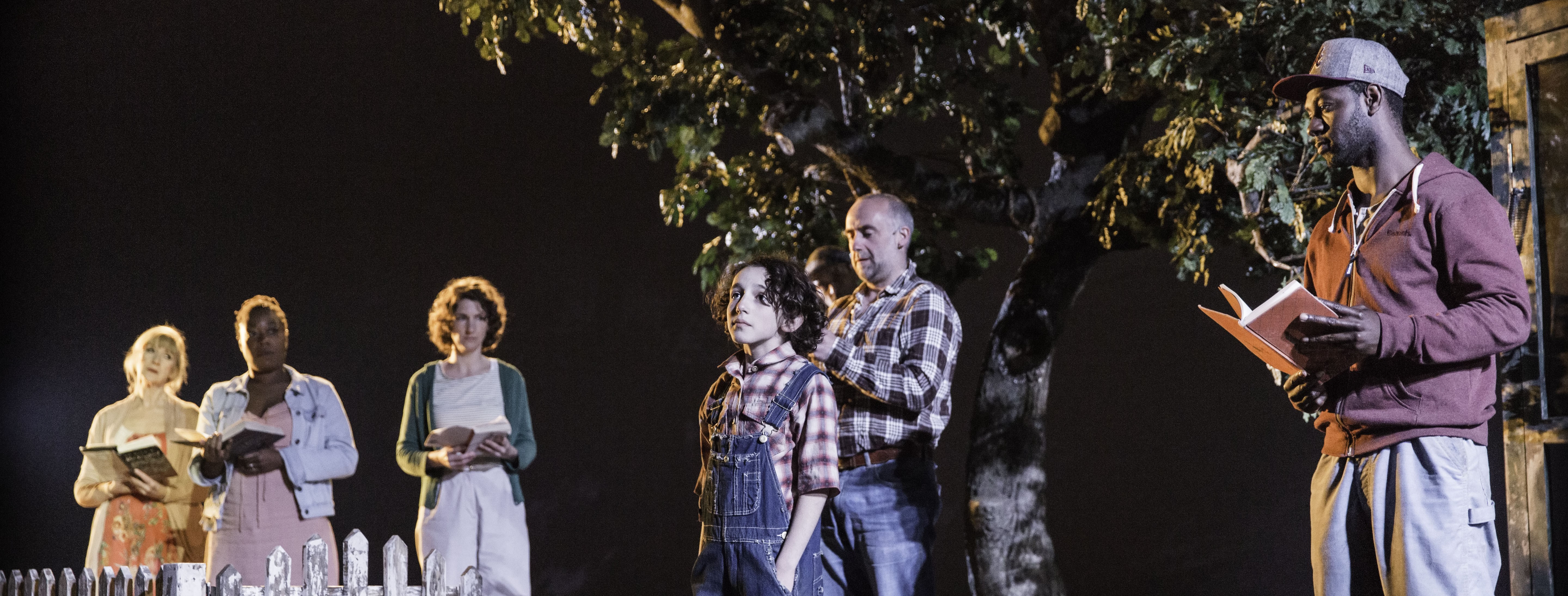Time To Kill a Mockingbird
“Atticus told me to delete the adjectives and I’d have the facts,” says Scout in the Open Air Theatre in Regent’s Park’s version of To Kill a Mockingbird. The production is awesome. Fact. Despite the adjective.
Set in the Deep South during the Great Depression, Harper Lee’s novel is the story of the Finch family – siblings Scout and Jem and their lawyer father Atticus. It revolves around the trial of Tom Robinson, a black man, who is accused of raping Mayella Ewell, a white girl, and Atticus, indicted by the local judge to defend the accused. The novel spans three years, following the children as they grow from innocent youths to mature young adults, hardened by the truth about their beloved town, Maycomb, Alabama. While once it was the setting of street games and rifle shooting, it now is ridden with racism, aggravated by poverty, and dominated by discriminations.
I had my reservations – and not just about the weather at the outdoor theatre. How would director Timothy Sheader capture the quintessentially Southern in the quintessentially English setting of Regent’s Park? What would his take on the Gothic elements, like the blizzard, the street fire or the mad dog be? And how would Boo Radley, Maycomb’s recluse, be portrayed? I had the classic symptoms of an anxious literature student; apprehensive that one of her favourite novels would be massacred before her eyes.
But there was no need to have felt such apprehension. Firstly, Sheader did not include blizzard or the fire at Miss Maudie’s house, and having thought about it, why would he? He works within the realms of the possible, and as a result, this is a production of remarkable heart and emotional depth. If you’re prone to blubber, then prepare yourself for a few tears; Sheader is not afraid to toy with the heartstrings.
I’ll get my cavils about the play out the way first, then I have free rein to ramble on about how touching, how magical and how utterly memorable the performance was (adjective overload, sorry Scout). The production gets off to a slightly cringey start, as actors pop out from amidst the audience, reading passages directly from the novel and there’s a man on a ukulele. There’s also a rather diverse range of Southern dialects on display so we encounter the soft, the deep, the redneck and the ‘twangy’.
But as the actors take to the stage, bare except for a tree with a tyre swing, and begin to sketch out Maycomb Town with chalk upon the stage floor, you know you’re in for something special. You even start to enjoy the ukulele.
The acting is impeccable. Robert Sean Leonard, aka House’s Dr James Wilson, is a fine Atticus Finch. He perfectly captures the typical lawyer’s balance of calm vehemently passion. Riche Smith is equally impressive as Tom Robinson. Although virtually unseen in the first half, when he takes to the witness stand after the interval, Smith comes into his own. His portrayal of the accused Robinson is gripping – he commands the audience’s attention in what could otherwise have been a very dull scene.
But the real stars of the show are the children – Scout (Eleanor Worthington-Co), Jem (Callum Henderson), and friend of the Finch children, Charles Baker Harris, otherwise known as Dill (Sebastian Clifford), steal the limelight. According to my mother (a primary school teacher of 27 years and therefore an expert on these matters) none can be older than 11 but their talents leave the rest of the audience feeling somewhat talentless. I could just about ride a bike without stabilisers at that age.
Scout, the narrator, shines the brightest, playing the animated tomboy with boundless energy, humour and heart. Worthington-Co’s portrayal of Scout’s growth, maturing from boisterous youth to wise young adult is extraordinary. She stands on Boo Radley’s porch and recounts Atticus’s earlier advice to her, “One time he said you never really know a man until you stand in his shoes and walk around in them.” The scene is particularly poignant, for in this moment she finally understands the meaning of her father’s words.
Unfortunately, the sell-out run at Regent’s Park has now come to a close, but I urge you to check out the Open Air Theatre’s next instalment: Austen’s Pride and Prejudice which runs until 20 July 2013. If To Kill a Mockingbird is anything to go by, I can almost guarantee you won’t be disappointed.

Comments (1)